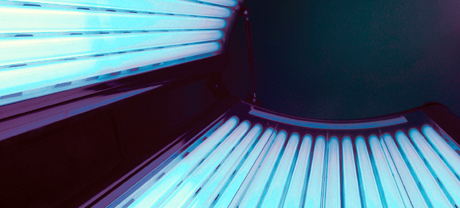Sunbeds give out ultraviolet (UV) rays that increase your risk of developing skin cancer (both malignant melanoma and non-melanoma). Many sunbeds give out greater doses of UV rays than the midday tropical sun.
The risks are greater for young people. Evidence shows that:
people who are frequently exposed to UV rays before the age of 25 are at greater risk of developing skin cancer later in life
sunburn in childhood can greatly increase the risk of developing skin cancer later in life
It’s illegal for people who are under the age of 18 to use sunbeds. The Sunbeds (Regulation) Act 2010 makes it an offence for someone operating a sunbed business to permit those under 18 to:
use a sunbed at the business premises, including beauty salons, leisure centres, gyms and hotels
be offered the use of a sunbed at the business premises
be allowed in an area reserved for sunbed users (unless they’re working as an employee of the business)
The GOV.UK website has further details about the Sunbeds (Regulation) Act 2010.
UV rays from sunbeds
Sunbeds, sunlamps and tanning booths give out the same type of harmful radiation as sunlight. UVA rays make up about 95% of sunlight. They can cause your skin to age prematurely, making it look coarse, leathery and wrinkled. UVB rays make up about 5% of sunlight and burn your skin.
A tan is your body’s attempt to protect itself from the damaging effect of UV rays. Using a sunbed to get a tan isn’t safer than tanning in the sun. It may even be more harmful, depending on factors such as:
the strength of UV rays from the sunbed
how often you use a sunbed
the length of your sunbed sessions
your skin type – for example, whether you have fair or dark skin
your age
In 2006, the Scientific Committee on Consumer Products concluded the maximum ultraviolet radiation (UVR) from sunbeds should not exceed 0.3W/m2, or 11 standard erythema doses per hour (erythema means reddening of the skin caused by sunburn). These 11 standard doses are the same as exposure to the tropical sun, which the World Health Organization (WHO) describes as extreme.
Damage from UV rays
Prolonged exposure to UV rays increases your risk of developing malignant melanoma, the most serious form of skin cancer.
You can’t always see the damage UV rays cause. The symptoms of skin damage can take up to 20 years to appear.
UV rays can also damage your eyes, causing problems such as irritation, conjunctivitis or cataracts, particularly if you don’t wear goggles.
Advice about using sunbeds
The Health and Safety Executive (HSE) issued advice on the health risks associated with UV tanning equipment, such as sunbeds, sunlamps and tanning booths. They recommend you should not use UV tanning equipment if you:
have fair, sensitive skin that burns easily or tans slowly or poorly
have a history of sunburn, particularly in childhood
have lots of freckles and red hair
have lots of moles
are taking medicines or using creams that make your skin sensitive to sunlight
have a medical condition made worse by sunlight, such as vitiligo (a long-term skin condition caused by a lack of a chemical in the skin called melanin)
have had skin cancer or someone in your family has had it
already have badly sun-damaged skin
The HSE advice also includes important points to consider before deciding to use a sunbed. For example, if you decide to use a sunbed, the operator should advise you about your skin type and how long you should limit your session to.
Read more about the HSE guidance on the use of UV tanning equipment (PDF, 102kb).
